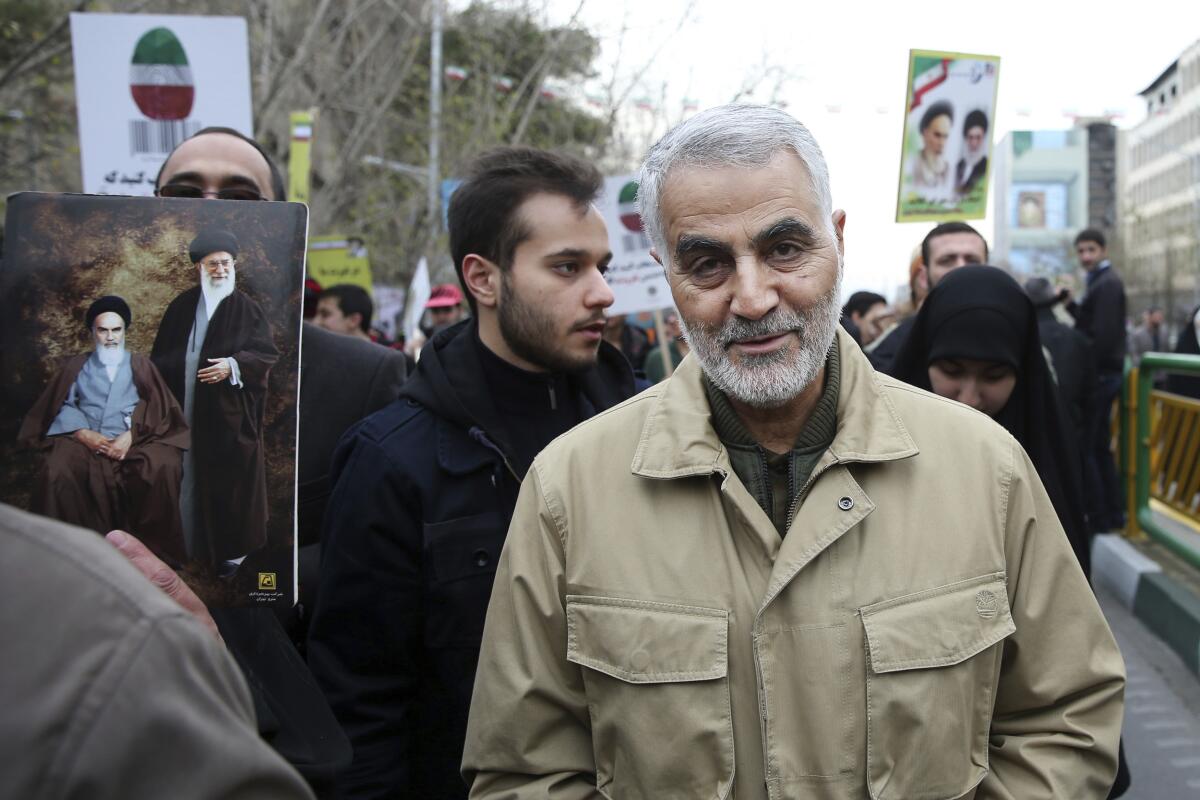Israel had advance notice of U.S. plan to kill Iranian general Suleimani, report says

- Share via
JERUSALEM — Israel had advance notice of the U.S. plan to kill Iranian military leader Gen. Qassem Suleimani, Israeli military and diplomatic analysts reported Friday night while refraining from providing further details due to heavy military censorship.
“Our assessment is that the United States informed Israel about this operation in Iraq, apparently a few days ago,” Barak Ravid, a journalist and commentator with deep sources in the Israeli security establishment, said on Channel 13.
An Israeli army officer with knowledge of Israeli military assessments, who spoke on the condition of anonymity because he did not have permission to speak to reporters, told the Los Angeles Times that the attack on Suleimani “did not come as a surprise.”
The reactions of Israel’s political leadership to Suleimani’s assassination were mostly positive, though deep concern was registered throughout the leadership.
Iran and Israel maintained warm relations for almost four decades before the 1979 Islamic Revolution that overthrew the shah and imposed a theocratic Shiiite Muslim regime that for four decades now has called for “death to Israel” and is accused of backing and masterminding numerous terrorist attacks against Israeli or Jewish targets, including the 1992 and 1994 attacks on the Israeli Embassy and the Jewish community center in Buenos Aires that left over 100 people dead. Hezbollah, the Lebanese-based Iranian proxy militia, has in recent years been accused of perpetrating further attacks against Israeli targets in India, Thailand and Bulgaria.
In September, a federal grand jury in New Jersey accused Alexei Saab, a 42-year-old Lebanon native and naturalized American citizen, of serving as a U.S.-based operative for Hezbollah’s terrorism wing for years, scouting landmarks including the Statue of Liberty and the Empire State Building for possible attacks. Israel considered unilateral military action against Iran during the Obama administration.
Early Friday, the Israeli army held an emergency meeting of its high military command, ordering the closure of the Mt. Hermon ski resort, which abuts southern Syria, where Iranian forces have been based during the years of Iran’s support for President Bashar Assad in the ongoing civil war.
Israeli residents along the northern border awoke to internet outages and disruptions on their landlines and cellphones as the army entered a higher level of preparedness.
Dolann Abu Saleh, the mayor of Majdal Shams, the city at the base of Mt. Hermon in the Israeli-occupied Golan Heights, said he was awakened by an Israeli army division commander at 6:45 a.m., shortly after after the hit on Suleimani.
Along with other local officials, he was told to heighten preparations in anticipation of possible local repercussions.
Just across the border from the ski lifts, Israel confronts the Islamic Revolutionary Guard Corps forces that were commanded by Suleimani. On the adjacent border, with Lebanon, Israel faces Hezbollah, an Iranian proxy army. The Gaza Strip, along Israel’s southern border, is ruled by Hamas, an Islamist militia supported by Iran.
Due to the heightened alarm, Prime Minister Benjamin Netanyahu cut short a visit to Greece, where he had signed an agreement for a regional gas pipeline.
He made a statement on the tarmac ahead of boarding his flight back to Israel, saying that the United States had the right to defend itself.
“Qassem Suleimani is responsible for the death of American citizens and many other innocent people. He was planning more such attacks. President Trump deserves all the credit for acting swiftly, forcefully and decisively. Israel stands with the United States in its just struggle for peace, security and self-defense.”
The Israeli army officer described the situation as “definitely higher readiness than usual, but not DEFCON One. We want to err on the side of caution, but we know we are not the first target. We are the second.”
Israel, long the target of Iranian threats and terrorist attacks, is acutely aware of its exposure to Iranian forces and proxy militias.
Opposition leader Benny Gantz, a former army chief who is running against Netanyahu in elections set to take place two months from now, applauded the killing as an “appropriate response to anyone responsible for the murder of countless innocent people and for undermining global stability.”
Over the last year, Israel has been run by a caretaker government, with two inconclusive elections, in April and September, having failed to achieve consensus. On Friday, Gantz warned Netanyahu — who in the last year has occasionally disclosed classified Israeli military activities in ways that critics say were politically motivated — against making any “allusions that compromise national security.”
Ofer Cassif, a parliamentarian from the majority Arab Joint List party, tweeted the gravest note of caution to those “popping open bottles of champagne today.”
“You don’t understand that Suleimani’s killing may lead to an attack against Israel,” he said. “If American bullying ends up costing Israeli lives, it will be on the hands of Trump and his criminal fugitive pal Netanyahu.”
Netanyahu was indicted on three criminal counts of corruption in November, and on Wednesday, on the eve of his trip to Greece, formally requested immunity from the Knesset, Israel’s parliament.
Lauding Suleimani’s support for “the Palestinian resistance,” Hamas issued a statement expressing its “sincere condolences and sympathy to the Iranian leadership and the Iranian people for the martyrdom” of Suleimani.
The Palestinian Authority did not respond to a request for comment.
More to Read
Sign up for Essential California
The most important California stories and recommendations in your inbox every morning.
You may occasionally receive promotional content from the Los Angeles Times.










